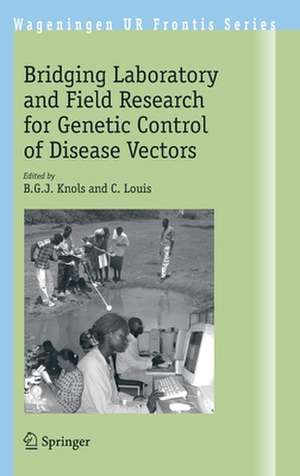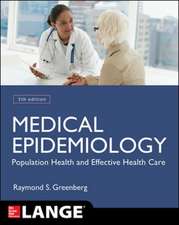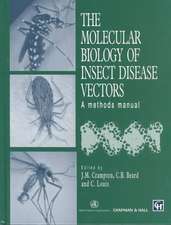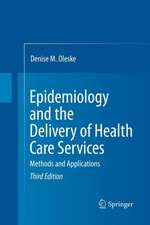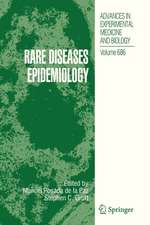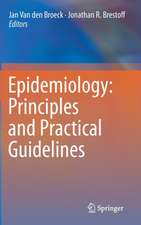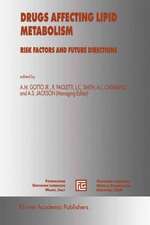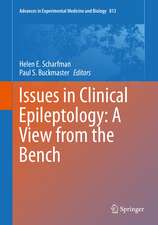Bridging Laboratory and Field Research for Genetic Control of Disease Vectors: Wageningen UR Frontis Series, cartea 11
Editat de B.G.J. Knols, C. Louisen Limba Engleză Paperback – 30 ian 2006
This book is the reflection of a workshop, held in Nairobi (Kenya) in July 2004. It brought together a good representation of both molecular and ecological research and, for the first time, included a significant number of researchers from disease-endemic countries.
| Toate formatele și edițiile | Preț | Express |
|---|---|---|
| Paperback (1) | 947.04 lei 43-57 zile | |
| SPRINGER NETHERLANDS – 30 ian 2006 | 947.04 lei 43-57 zile | |
| Hardback (1) | 947.85 lei 43-57 zile | |
| SPRINGER NETHERLANDS – 31 aug 2006 | 947.85 lei 43-57 zile |
Din seria Wageningen UR Frontis Series
- 15%
 Preț: 633.35 lei
Preț: 633.35 lei - 18%
 Preț: 940.72 lei
Preț: 940.72 lei - 18%
 Preț: 1230.35 lei
Preț: 1230.35 lei - 18%
 Preț: 948.16 lei
Preț: 948.16 lei - 24%
 Preț: 1042.95 lei
Preț: 1042.95 lei - 18%
 Preț: 942.44 lei
Preț: 942.44 lei - 24%
 Preț: 1028.82 lei
Preț: 1028.82 lei - 24%
 Preț: 787.48 lei
Preț: 787.48 lei - 18%
 Preț: 946.55 lei
Preț: 946.55 lei - 24%
 Preț: 1035.77 lei
Preț: 1035.77 lei - 18%
 Preț: 944.06 lei
Preț: 944.06 lei - 18%
 Preț: 1213.34 lei
Preț: 1213.34 lei - 24%
 Preț: 1045.91 lei
Preț: 1045.91 lei - 18%
 Preț: 1224.36 lei
Preț: 1224.36 lei - 18%
 Preț: 1218.83 lei
Preț: 1218.83 lei - 18%
 Preț: 1218.06 lei
Preț: 1218.06 lei - 18%
 Preț: 941.38 lei
Preț: 941.38 lei - 18%
 Preț: 938.66 lei
Preț: 938.66 lei - 15%
 Preț: 639.08 lei
Preț: 639.08 lei - 18%
 Preț: 941.68 lei
Preț: 941.68 lei - 24%
 Preț: 791.78 lei
Preț: 791.78 lei - 15%
 Preț: 639.59 lei
Preț: 639.59 lei -
 Preț: 380.63 lei
Preț: 380.63 lei - 15%
 Preț: 629.56 lei
Preț: 629.56 lei
Preț: 947.04 lei
Preț vechi: 1154.93 lei
-18% Nou
Puncte Express: 1421
Preț estimativ în valută:
181.21€ • 189.71$ • 149.94£
181.21€ • 189.71$ • 149.94£
Carte tipărită la comandă
Livrare economică 07-21 aprilie
Preluare comenzi: 021 569.72.76
Specificații
ISBN-13: 9781402038006
ISBN-10: 1402038003
Pagini: 240
Ilustrații: X, 229 p.
Dimensiuni: 210 x 297 x 13 mm
Greutate: 0.49 kg
Ediția:2006
Editura: SPRINGER NETHERLANDS
Colecția Springer
Seria Wageningen UR Frontis Series
Locul publicării:Dordrecht, Netherlands
ISBN-10: 1402038003
Pagini: 240
Ilustrații: X, 229 p.
Dimensiuni: 210 x 297 x 13 mm
Greutate: 0.49 kg
Ediția:2006
Editura: SPRINGER NETHERLANDS
Colecția Springer
Seria Wageningen UR Frontis Series
Locul publicării:Dordrecht, Netherlands
Public țintă
ResearchCuprins
Lessons learnt and anticipated benefits.- Executive summary.- Report of the working-group meeting.- Review of previous applications of genetics to vector control.- Genomics and expected benefits for vector entomology.- Current state and future needs of laboratory and field science.- Genetic approaches for malaria control.- Current thoughts about the integration of field and laboratory sciences in genetic control of disease vectors.- Genetic approaches in Aedes aegypti for control of dengue: an overview.- Regional situation reports: malaria and dengue.- Malaria and dengue vector biology and control in West and Central Africa.- Malaria and dengue vector biology and control in Southern and Eastern Africa.- Malaria and dengue vector biology and control in Southeast Asia.- Malaria and dengue vector biology and control in Latin America.- Integration.- Transition from the laboratory to the field and effective interplay.- Evaluation of drive mechanisms (including transgenes and drivers) in different environmental conditions and genetic backgrounds.- Tools for monitoring the genetic structure and stability of mosquito populations.- What are relevant assays for refractoriness?.- Fitness studies: developing a consensus methodology.- Mosquito mating behaviour.- Pathogen evolution issues in genetically modified mosquito vector strategies.- Models to investigate some issues regarding the feasibility of driving refractoriness genes into mosquito vector populations.- Identification and characterization of field sites for genetic control of disease vectors.- Application of genetically modified mosquitoes in national vector control programmes: thoughts on integrated control.- Entomological correlates of epidemiological impacts: how do we know it is working?.- Ethical, legal and social issues in the use of genetically modified vectors for disease control.
Caracteristici
For the first time, includes a significant amount of research from disease-endemic countries Bridges the gap between laboratory and field research on genetic control of disease-transmitting insects
